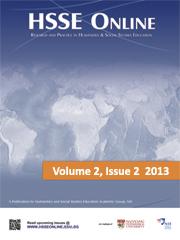Magic Words: Writing as a Tool for Learning in the Humanities
Keith C. Barton (Indiana University) Keywords History Social Studies Secondary School Literacy Writing can be a powerful tool for learning in the Humanities. When used well,

A Note from the Editors
Nation-states face numerous pressing issues such as increasing inequality, climate change, immigration, and tensions between individual rights and social harmony. In Not for Profit: Why Democracy Needs the Humanities, Martha Nussbaum argues that national development goals, focusing almost exclusively on productivity and economic growth, are misguided. Not everything is about profit and development. People strive for lives of meaning, dignity, and fulfillment. People also need to be able to define their own life goals, values, and the kind of society that they want to live in. Humanities and social studies educators should, therefore, play a significant role in helping young people learn how to ask important questions about social justice, race and gender relations, quality of life, the environment, and ethical and socially responsible uses of science and technology. These questions require young people to draw on capacities fostered by the humanities – capacities for critical thinking, imagination, empathy, and justice.
Humanities and social studies education can provide spaces and tools for considering matters of individual well-being, social connectedness and cohesion, culture and values, and civic participation. It can provide opportunities for people to find meaning and satisfaction in a sense of the places they encounter (geography), their understanding of the past (history), deliberation over important social issues and policies (social studies), and in the inspiration and insights that literature offers. A good humanities and social studies education should cultivate, in students, the ability to deliberate with others over significant matters, ask important questions, understand other points of view, think independently, imaginatively, and critically, and communicate effectively. Young people need guidance in developing these capacities and the authors in this issue offer ideas and strategies that we hope will help humanities and social studies educators consider different curricular and instructional approaches that meet these goals.
In this issue, Keith Barton highlights the role of writing as a tool for learning in humanities education. By using “magic words” in their writing, students can not only improve essential communication skills but also learn about important subject matter. Similarly, James Damico’s article offers several literacy strategies that can be employed in source work to help students evaluate claims and evidence. This is a core skill in humanities and social studies education. Students must read and understand information sources and think critically about whether ideas, messages, and assertions are reasonable and supported by sufficient evidence.
Rindi Baildon notes the importance of key historical concepts for learning and understanding history. Her article outlines the ways she and her 10-11 year old students use the concept of significance to integrate language arts and social studies, help students organize their learning, and promote appreciation of the importance of key groups and individuals in their communities.
Elissa Goh and Chew Hung Chang offer different approaches to help teachers and students develop important conceptual understanding in geography. Chang’s article focuses on a framework to help teachers better understand concepts that are necessary for planning and teaching climate change while Goh’s article features a school-based action research study that found fieldwork to be crucial in helping students appreciate local environments and understand the need for environmental management.
We have also included a new section in this issue, “Critical Teacher Reflection,” to highlight teachers’ critical analyses of contexts, curriculum, classroom practice, and key issues that affect humanities and social studies education. In this issue, Brenda Ng critically analyzes a Primary 5 Social Studies chapter using a postmodern theory lens. She found that the text was written from a singular perspective and thus failed to consider the multiple perspectives that might better serve the critical thinking skills highlighted in the syllabus. Lee Seng Lee’s article considers possibilities for teaching Geography for social justice. He concludes by calling for “a more flexible curriculum supported by the Ministry of Education and for greater teacher agency and autonomy to incorporate social justice in their practice.”
We hope you will find HSSE Online to be useful for your research and teaching. We also hope that you will continue to consider the ways in which we can all help make humanities and social studies education more relevant, engaging, exciting, and powerful for young people.
As before, we invite you to share your opinions and perspectives with the other readers in the online forum and give feedback on any of the contributions in this issue. We also urge all readers to contribute articles and teaching resources so as to make this journal even more exciting and intellectually stimulating. Finally, we hope you’ll spread the word about HSSE Online to friends and colleagues!
Mark Baildon
Li-Ching Ho
Editors, HSSE Online
April 2013
Keith C. Barton (Indiana University) Keywords History Social Studies Secondary School Literacy Writing can be a powerful tool for learning in the Humanities. When used well,
Rindi Baildon (Singapore American School) Keywords History Social Studies Primary School Historical thinking The study of significant people in history can be an engaging, meaningful, and
Yi Ling Elissa Goh (New Town Secondary School, Singapore) Keywords Geography Secondary School Fieldwork The impetus for action research on experiential learning of geography stems from
Chew Hung Chang (National Institute of Education, Singapore ) Keywords Geography Secondary School Curriculum Cities like Singapore have implemented numerous planning norms and policies that are
Brenda Ng (Rivervale Primary School, Singapore) Keywords Social Studies Primary School Curriculum Postmodern theory helps us examine how and why particular pasts are constructed, legitimated and
Copyright Sustainability Learning Lab 2022 – All Rights Reserved